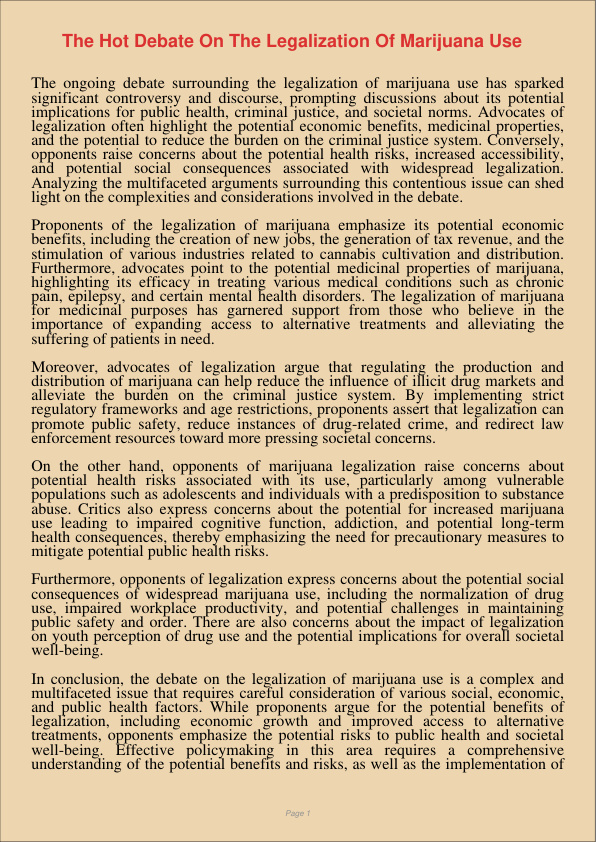The Hot Debate On The Legalization Of Marijuana Use
Dec 31, 2023
marijuana use
hot debate
Journalism & Communication
Philosophy

The ongoing debate surrounding the legalization of marijuana use has sparked significant controversy and discourse, prompting discussions about its potential implications for public health, criminal justice, and societal norms. Advocates of legalization often highlight the potential economic benefits, medicinal properties, and the potential to reduce the burden on the criminal justice system. Conversely, opponents raise concerns about the potential health risks, increased accessibility, and potential social consequences associated with widespread legalization. Analyzing the multifaceted arguments surrounding this contentious issue can shed light on the complexities and considerations involved in the debate.
Proponents of the legalization of marijuana emphasize its potential economic benefits, including the creation of new jobs, the generation of tax revenue, and the stimulation of various industries related to cannabis cultivation and distribution. Furthermore, advocates point to the potential medicinal properties of marijuana, highlighting its efficacy in treating various medical conditions such as chronic pain, epilepsy, and certain mental health disorders. The legalization of marijuana for medicinal purposes has garnered support from those who believe in the importance of expanding access to alternative treatments and alleviating the suffering of patients in need.
Moreover, advocates of legalization argue that regulating the production and distribution of marijuana can help reduce the influence of illicit drug markets and alleviate the burden on the criminal justice system. By implementing strict regulatory frameworks and age restrictions, proponents assert that legalization can promote public safety, reduce instances of drug-related crime, and redirect law enforcement resources toward more pressing societal concerns.
On the other hand, opponents of marijuana legalization raise concerns about potential health risks associated with its use, particularly among vulnerable populations such as adolescents and individuals with a predisposition to substance abuse. Critics also express concerns about the potential for increased marijuana use leading to impaired cognitive function, addiction, and potential long-term health consequences, thereby emphasizing the need for precautionary measures to mitigate potential public health risks.
Furthermore, opponents of legalization express concerns about the potential social consequences of widespread marijuana use, including the normalization of drug use, impaired workplace productivity, and potential challenges in maintaining public safety and order. There are also concerns about the impact of legalization on youth perception of drug use and the potential implications for overall societal well-being.
In conclusion, the debate on the legalization of marijuana use is a complex and multifaceted issue that requires careful consideration of various social, economic, and public health factors. While proponents argue for the potential benefits of legalization, including economic growth and improved access to alternative treatments, opponents emphasize the potential risks to public health and societal well-being. Effective policymaking in this area requires a comprehensive understanding of the potential benefits and risks, as well as the implementation of robust regulatory measures to ensure responsible and informed use, should legalization be pursued. A balanced approach that prioritizes public health, safety, and education is crucial in addressing the multifaceted challenges and considerations associated with the legalization of marijuana use.